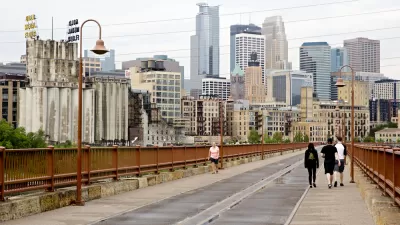A columnist presents criticisms and recommendations for both sides of the density debate as Minneapolis considers a new comprehensive plan.

"The trouble with city planning is that it’s about the future, while any city’s crankiest constituents prefer the present or, in some cases, the past."
So goes the outset of an article by Steve Berg, written to wrestle with the density controversies of the contemporary Twin Cities region.
In all, 167 cities in the region are preparing "documents aimed at telling the Metropolitan Council how they plan to grow between now and 2040." As reported earlier this month, Minneapolis in included in that process. The public comment period for the draft Minneapolis 2040 Comprehensive Plan is wrapping up soon, with changes likely coming as a result of opposition to proposed increases in density.
Though anecdotes from cities around the region are sprinkled into the column, Berg focuses on Minneapolis, where "[a]round every corner, it seems, our low-slung outpost on the northern prairie is looking more like a city." The causes are similar to pressures pushing development inward and upward in cities like Denver, San Diego, and Seattle, according to Berg, but in many ways cities are in denial.
Berg offers his critique of Minneapolis's proposed comprehensive plan (i.e., pro-development interests overstepped with the "fourplex" idea and conservatives are persistently destructive in opposition to transit investments). Still, Berg's position is pro-density, for the sake of the planet and the economic competitiveness of the region.
FULL STORY: City planning: Density is destiny

Alabama: Trump Terminates Settlements for Black Communities Harmed By Raw Sewage
Trump deemed the landmark civil rights agreement “illegal DEI and environmental justice policy.”

Planetizen Federal Action Tracker
A weekly monitor of how Trump’s orders and actions are impacting planners and planning in America.

Why Should We Subsidize Public Transportation?
Many public transit agencies face financial stress due to rising costs, declining fare revenue, and declining subsidies. Transit advocates must provide a strong business case for increasing public transit funding.

Judge Orders Release of Frozen IRA, IIJA Funding
The decision is a victory for environmental groups who charged that freezing funds for critical infrastructure and disaster response programs caused “real and irreparable harm” to communities.

‘Clybourne Park’ Sets Stage for Housing Equity Discussions
Clybourne Park, a play exploring race, real estate, and community tensions, can set the stage for discussion on the lasting impacts of housing discrimination, gentrification, and the fight for affordability.

Understanding Road Diets
An explainer from Momentum highlights the advantages of reducing vehicle lanes in favor of more bike, transit, and pedestrian infrastructure.
Urban Design for Planners 1: Software Tools
This six-course series explores essential urban design concepts using open source software and equips planners with the tools they need to participate fully in the urban design process.
Planning for Universal Design
Learn the tools for implementing Universal Design in planning regulations.
Caltrans
Smith Gee Studio
Institute for Housing and Urban Development Studies (IHS)
City of Grandview
Harvard GSD Executive Education
Toledo-Lucas County Plan Commissions
Salt Lake City
NYU Wagner Graduate School of Public Service





























